- Clinical Technology
- Adult Immunization
- Hepatology
- Pediatric Immunization
- Screening
- Psychiatry
- Allergy
- Women's Health
- Cardiology
- Pediatrics
- Dermatology
- Endocrinology
- Pain Management
- Gastroenterology
- Infectious Disease
- Obesity Medicine
- Rheumatology
- Nephrology
- Neurology
- Pulmonology
Petechiae From Valsalva Maneuver and Spider Angioma
A 54-year-old woman presents with an asymptomatic rash of sudden onset on both malar cheeks that developed 1 day earlier. She denies any facial trauma.
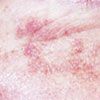
Case 1:
A 54-year-old woman presents with an asymptomatic rash of sudden onset on both malar cheeks that developed 1 day earlier. She denies any facial trauma. Recently, she has had a viral GI illness, but she is feeling better today.
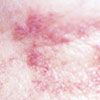
What do you suspect?
A. Rosacea.
B. Photodrug reaction.
C. Petechiae from Valsalva maneuver.
D. Amyloidosis.
E. Estrogen-induced telangiectasia.
(Answer on next page.)

Case 1: Petechiae from Valsalva maneuver secondary to vomiting
Petechiae developed as a result of increased thoracic pressure, C, caused by episodes of vomiting associated with the patient's recent GI illness. The rash resolved uneventfully.

Rosacea would not develop this quickly. A photodrug reaction would consist of erythematous patches, not petechiae. Amyloidosis is associated with conjunctival and eyelid purpura but not petechiae of the malar cheek. The sudden onset of this patient's rash ruled out estrogen-induced telangiectasia, which would develop insidiously over several months.
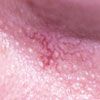
Case 2: For 2 months, a 19-year-old man has had an asymptomatic red spot on his eyelid. He is otherwise healthy.
Which of the following is not associated with this lesion?
A. Cirrhosis.
B. Arteriovenous malformation.
C. Hepatitis C.
D. Elevated estrogen levels.
E. Basal cell carcinoma.
F. Sun exposure.
G. Rosacea.
(Answer on next page.)

Case 2: Spider angioma
Spider angiomas are associated with cirrhosis, hepatitis C, elevated estrogen levels, basal cell carcinoma, sun exposure, and rosacea; however, these lesions are not associated with arteriovenous malformation, B.
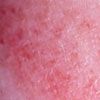
Case 3: A 61-year-old woman has had an asymptomatic eruption on her lower leg for several days. She has systemic lupus erythematosus and rheumatoid arthritis. Both diseases have been relatively quiescent recently. She denies any fever or chills or flares of joint pain.
What is your clinical impression?
A. Cutaneous discoid lupus erythematosus.
B. Systemic lupus erythematosus skin lesion.
C. Leukocytoclastic vasculitis secondary to underlying connective-tissue disease.
D. Majocchi disease.
E. Stasis dermatitis.
(Answer on next page.)

Case 3: Benign pigmented purpura (Majocchi disease)
A biopsy confirmed the diagnosis of Majocchi disease, D, one of the pigmented purpuric dermatoses. The circular lesion shown here is characteristic of this benign lymphocytic capillaritis.
Discoid lupus and systemic lupus erythematosus lesions tend to occur on the head and neck and on sun-exposed areas. They are usually inflammatory patches and plaques and are not petechial. Leukocytoclastic vasculitis can resemble Majocchi disease, and biopsy may be required in order to differentiate the 2 conditions. The varicosities associated with stasis dermatitis do not appear petechial.
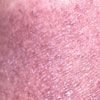
Case 4:
A 37-year-old woman seeks evaluation of an asymptomatic eruption of several days' duration that is confined to one leg. There is no history of recent trauma, and she is otherwise healthy.
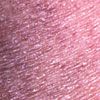
Do you recognize this eruption?
A. Schamberg disease.
B. Cellulitis.
C. Leukocytoclastic vasculitis.
D. Erythema nodosum.
E. Acute stasis dermatitis.
(Answer on next page.)

Case 4: Schamberg disease
This petechial eruption is consistent with Schamberg disease, A. Aggregates of pinhead-sized petechiae resembling grains of cayenne pepper, along with hemosiderin staining, are typically seen on the lower extremity.

Cellulitis and erythema nodosum are painful eruptions. Stasis dermatitis is associated with leg swelling. Because leukocytoclastic vasculitis can mimic Schamberg disease, biopsy may be required to establish the diagnosis.
